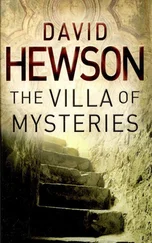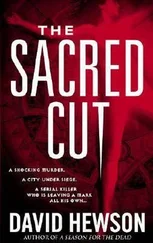“We’re artists! We’re the kind of people who made Venice what it is!”
Massiter laughed, not unkindly. “Oh, Michele. Please. Don’t be so precious. You’re a bunch of Chioggia boatbuilders, one of whom happened to have an idea that worked for a little while. No one’s interested in your art anymore. It’s passé. That’s the problem with fashion. One day it’s in. The next . . .” He held up his hands.
“You’re too close to all this,” he continued. “So am I, in a way. Emily, on the other hand, has an admirable and cold indifference. We would both do well to listen.” He glanced at her, a warm glance, one that almost made her feel guilty. “Her advice is aimed at both of us. Whatever you may feel.”
“And that advice is what exactly?” Michele grumbled.
She knew the right reply instinctively. “For Hugo? To walk away. Right out of this room without even thinking about going through with this contract, even on the conditions sitting on the table right now. The survey of the island is incomplete and probably corrupt. I don’t need access to the bank accounts of some of the people involved here to understand that most of the reports are down to bribery, not fact. The state of the foundations, of the construction, the iron, the wood, the entire fabric of the palazzo . . . Hugo’s writing a blank cheque for everything, and without at least two months spent on proper, independent surveys, I can’t begin to calculate what the possible cost of putting that place straight might be.”
“It’s sound!” Michele yelled. “Besides, he’s squared the reconstruction costs with his friends in the regions. It’s public money that gets spent, not his.”
“That’s irrelevant. The place is a wreck,” she went on. “Had the fire in the fornace gone on for another fifteen minutes, we might not have a property to be discussing right now. Which could have been for the better. You didn’t start that yourself, did you?”
The man slammed his fist on the table. “I didn’t come here to be insulted.”
“Just a thought,” she continued. “It could have made sense. Your island is a shell. Rotten, empty, just waiting to collapse. And without Hugo, it will, too. You need his money. You don’t have time for alternatives.”
She looked at the brother. “Tell him, Gabriele. You work in those buildings. He just sits in the house trying to cook the books. Tell him the truth. It’s time someone did.”
The younger brother shuffled in his seat, refusing to look at anything but the papers on the table.
“Well?” Michele demanded.
“It’s bad,” Gabriele said quietly. “Worse than you know, Michele. The place is falling down. Sometimes I’d work and I’d wonder how long it would last. What might happen if we got another storm. It’s . . .”
He stared at the images of the palazzo in front of him, the place restored to some kind of glory, the restaurant tables on the extended quayside, the boats bringing in the tourists to the hotel.
“It’s time to put an end to this. We can’t go on anymore. Not without Uriel. Not without money.”
“I sign for the family,” Michele snapped. “That was agreed. It’s down on paper.”
“That’s agreed,” Gabriele concurred.
“And if I don’t sign,” the older brother continued, pointing an angry finger in Massiter’s face, “we all go down with this particular ship. You. Us. Those crooks in the city. Everyone.”
“Everyone?” Massiter echoed, laughing. “I don’t think so. I’ve a talent for walking away from train wrecks. Hadn’t you noticed? Of course, if you really want to risk taking others with you . . .”
Massiter stared the man down. They both knew how unwise such a course of action would be.
Michele Arcangelo scowled and was silent.
Emily Deacon packed away her pen and notepad. “I’ve got nothing else to add here, Hugo,” she declared. “If you want to go ahead with this nonsense, then do so. Just don’t wave the bill in my face when it all goes wrong.”
“Leave us some dignity,” Michele snarled. “A place to work? A place to sell? Is that too much to ask?”
“Not at all,” Massiter answered. “I’ve an industrial unit near Piazzale Roma. It’s modern. Efficient. Take it. I’ve some retail outlets in the Strada Nuova too. Have one of those.”
Michele winced at the very name of the street. Emily knew the long drag from the station to San Marco, a parade of cheap tourist shops selling overpriced junk to gullible visitors.
“You can pass off anything as genuine there,” Massiter went on. “Take them, Michele. Rent-free for a decade. You can sell your little souvenirs there.”
“The Strada Nuova . . .” Michele let loose a short string of Venetian curses. “So I’m to be a shopkeeper now?”
“There’s a great future in shopkeeping hereabouts,” Massiter said. “More so than in making glass trinkets no one wants to buy. These are luxurious times only for those who can afford it. None of us can pick and choose anymore. I was content to live off an auction house once. Now I need to develop a little property, extend my range of friends. Only a fool thinks the world must change around him. We all have to find our own way. Listen to your own brother.”
Gabriele Arcangelo glowered at Massiter. “I’d like some dignity too,” he remarked.
“Then take it,” Massiter said severely. “Don’t test my generosity. A place to make your glass. A place to try to sell it. Free for ten years. Either that or ruin.” He leaned forward, emphasising the point. “Utter ruin. Perhaps jail for you, Michele. Or worse.”
The older man shook his head, full of regret. “I should never have allowed you through the door that day. I could have found others . . .”
“But you did!” Massiter replied with sudden spirit. “You invited me, if you recall. I only go where I’m welcome. I thought you understood that. And now . . .”
He withdrew a pen from his monogrammed shirt pocket. A large, gold Parker. He slid it across the table.
“You can use this in front of the mayor. Pretend it’s yours. Keep it after. Just one thing . . .”
Michele glared at the shining pen. “What?”
“Don’t linger once the place is mine,” Hugo Massiter said, with a deprecating smile.

BY THE TIME GIANNI PERONI ROUNDED THE PIAZZA BY the Arsenale gates, uniformed state police officers were erecting tape barriers to keep out the curious, and stealing snatched glances at the corpse still visible by the stone lion, leaking blood onto the stones.
Shattered face uppermost, dead eyes staring at the blazing sun, Gianfranco Randazzo didn’t look any more content with the world in death than he had in life. Nor had it been an easy departure. Peroni was sufficiently familiar with gunshot wounds to recognise that it had been a particularly cruel killing. The commissario had been wounded several times in the legs and torso, then crawled from the overturned restaurant tables nearby, leaving a trail of gore, before suffering a final shot to the head, presumably while still on the ground.
Peroni knew a hit when he saw one. Randazzo had been taken out with a savage, single-minded deliberation, and it was clear from the way the uniforms and a couple of plainclothes men were acting, more like disconcerted street cleaners than busy cops, none of the commissario’s killers had stayed around long enough to be apprehended.
Zecchini and his officers finally caught up with him, breathless, wide-eyed at the carnage in front of them.
“I suppose I don’t need to ask,” the Carabinieri major murmured, sweating hard, gasping to get some thin afternoon air into his lungs.
Читать дальше













